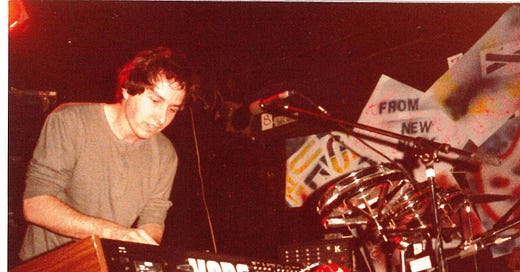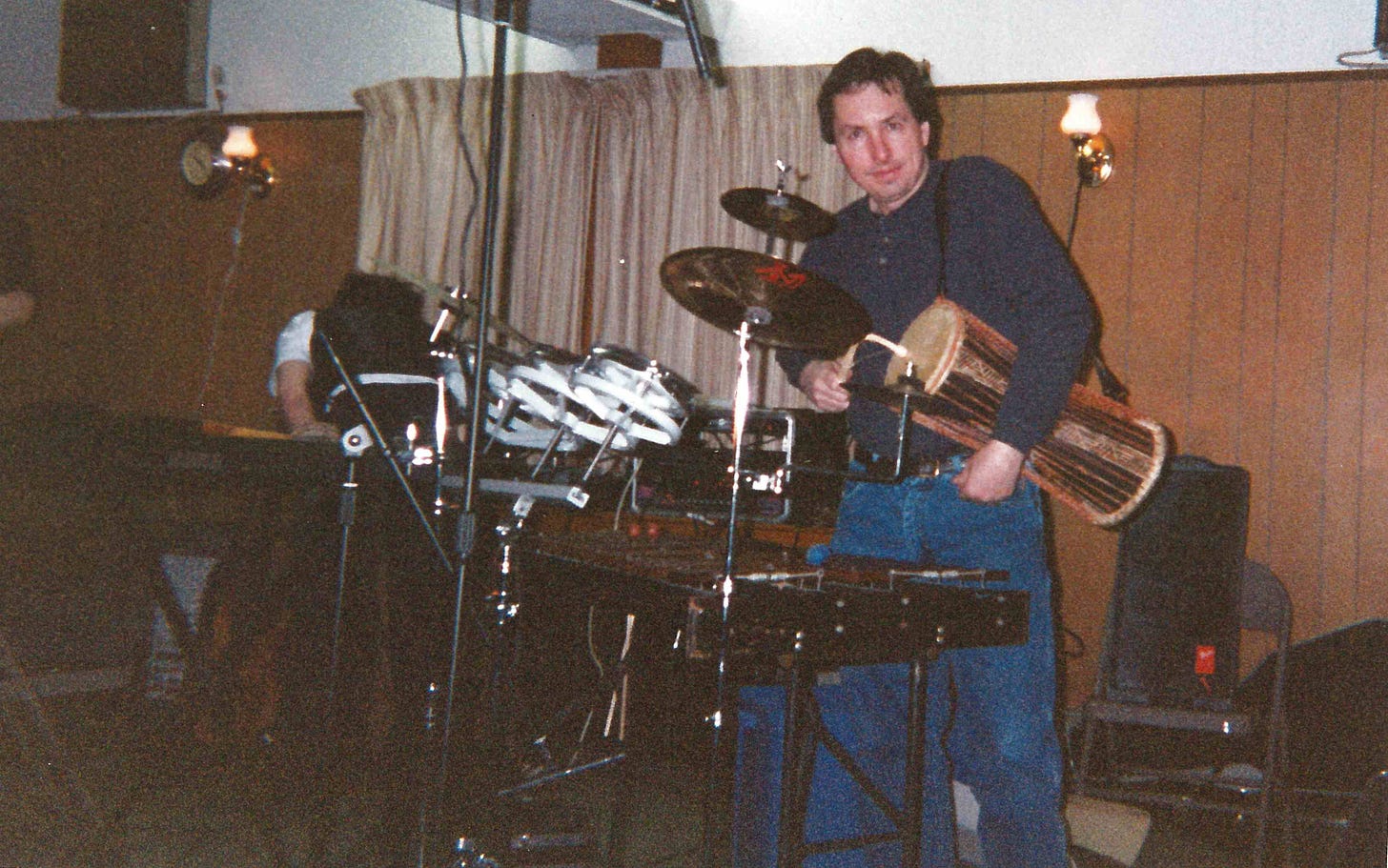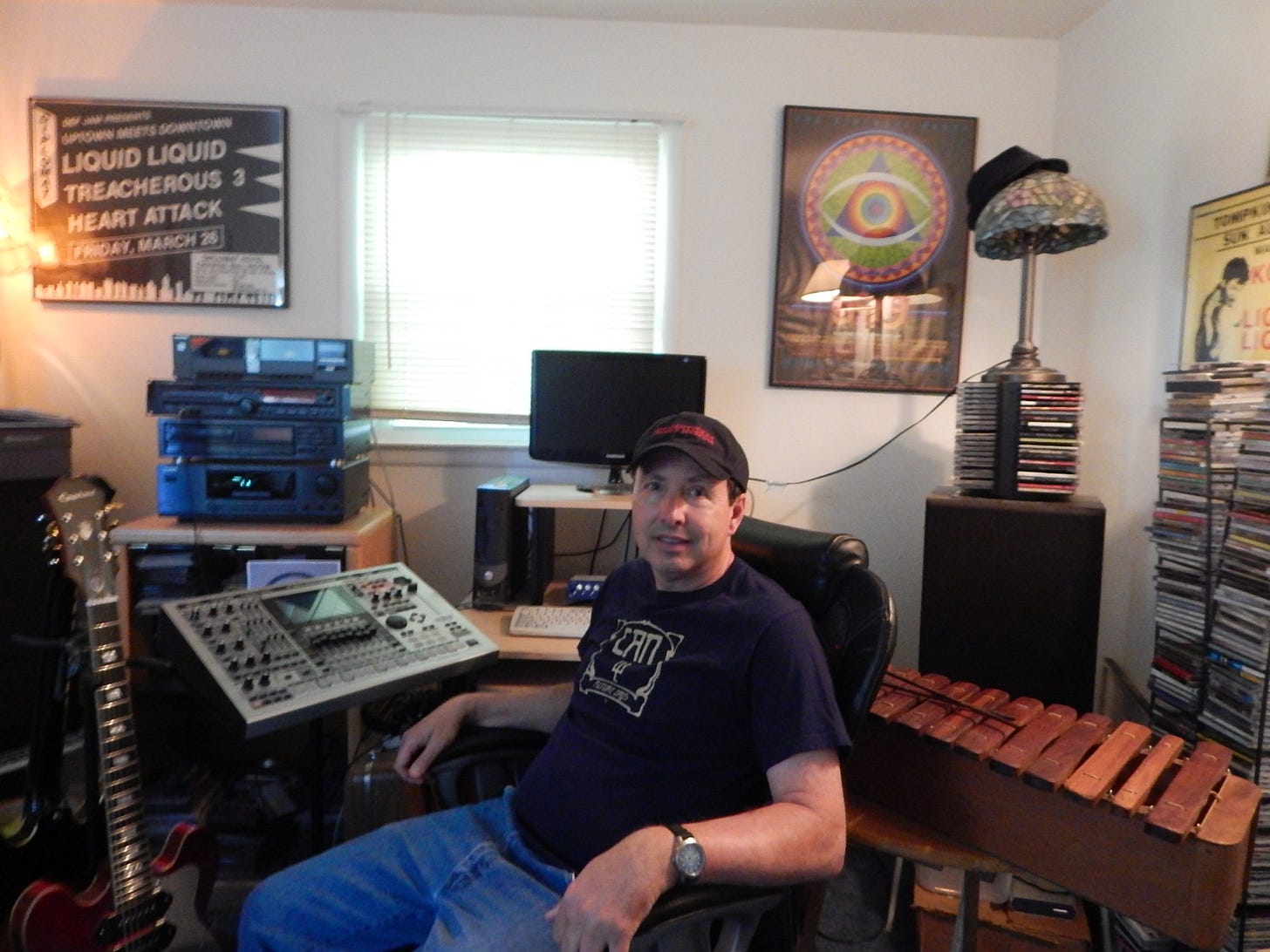This week’s edition of Selected Works is an interview with Dennis Young. Dennis might be best known as the marimba player and percussionist Dennis Young, but since Liquid Liquid first broke up in the mid 1980s, Dennis has continued to explore new ways in sound. He’s just had a couple of new albums come out, so I thought it could be cool to explore some aspects of his history in a conversation. Read on.
In the late 1970s, New Jersey musician and producer Dennis Young started jamming with some friends while studying at Rutgers University. They called themselves Idiot Orchestra and later Liquid Idiot before settling on the name Liquid Liquid, before becoming one of the most important bands in New York's storied 1980s downtown scene. As Dennis told me in an interview for Bandcamp Daily in early 2020, "There was a sound in the air... It was an era of heavy beat music, ESG, Defunkt, Pigbag and us—but people didn’t know what to make of us."
Liquid Liquid went on to release Liquid Liquid released four EP’s through Ed Bahlman’s immaculately curated 99 Records, crafting a texture and rhythm-led soundworld that opened wormholes between no-wave, post-disco, and post-punk. They wowed audiences at all of the city's top clubs and were even sampled for Grandmaster Flash & The Furious Five's second opus, 'White Lines'.
In their era, Liquid Liquid was a candle that burned twice as bright and half as long. By 1985, the group was done. Dennis moved on to experimenting with home studio recordings and synthesizers and releasing five limited-run cassette tapes through his private press label, Daylight Productions/Day & Nite Music. Over the last few years, Seoul's excellent Daehan Electronics label has been reissuing these tapes in vinyl editions. Considered as a whole, the tapes chart a star path through new age and ambient music - washes of synth, wonderland melodies, bubbling marimba, hypnotic rhythms and the odd airy vocal, all bathed in calming tape hiss.
Writing to me via email, Dennis once mentioned that he is always trying to find new ways to make music, which is precisely what happened after he completed his new age/ambient cassette tape series. This impulse continues today with his latest albums Open Roads and Grey Umbrella, and the production work he has been doing for his musician friends Brad Kleiman and Ray Bally. Earlier in the month, I got on the phone with him again and asked him about this impulse.
"Well, I think it just happened naturally," said Dennis. "When I was in Liquid Liquid, I was doing electronic music at home. After the band, I just continued to explore different avenues of what I can do. I did a world music record called Old Dog, New Tricks, with a lot of musicians. Then I did a singer-songwriter record called Shadow. I've just always been trying to make different music. It's just, that's the way it's been. I don't know what's gonna be next. I just know where I'm at, at this point, and I'm continuing to explore."
Martyn Pepperell: You've spent over forty years playing and recording music. How do you keep yourself interested in continuing to try new things out?
Dennis Young: I think what helps with exploring is when you get a new instrument, a new microphone, or something new. With this recent record, I got a new microphone, a really, really good vocal mic. When I was testing it out, all the songs started happening. That's always been a sparkplug for me. Even during the Liquid Liquid days and after, I was buying different synthesizers, trying things out, and hearing songs out of that. That's a big help.
Martyn Pepperell: What do you think have been some of the most important instruments or pieces of musical equipment in your development?
Dennis Young: The first would be the marimba. I was actually a drummer. I wanted to be a professional drummer before I joined Liquid Liquid. Then, by chance, I bought a marimba. So I started to learn how to play notes and everything. After that, I bought a Korg Mono/Poly synthesizer, a polyphonic synthesizer. I think those two instruments paved the way for my development.
The Korg Mono/Poly didn't even have MIDI, but the nice thing about it was, it had four oscillators. You could do a lot of unique things with that. Plus, I had a delay and flanger. I wrote a whole bunch of electronic music on the Mono/Poly. The German label Bureau B reissued it all as a compilation a few years ago. I regret selling that synthesizer.
The next really significant instrument was the Korg M1. It was significant because it let me save sounds, and I could also use it as MIDI. I could attach it to an external sequencer that I had and an external drum machine. Then I bought a D50 Roland keyboard. After that, I was able to connect all of them and write songs that way. This all culminated in the planetarium shows I did in 1994. I did five shows at this planetarium in New Jersey. I sent them the music in advance and the guy who ran the place sorted out visuals. If you like electronic music, it’s great. That was kind of the peak of all of that for me.
Martyn Pepperell: When did guitars come into the picture for you?
Dennis Young: I took a little break from making music for a couple of years in 1998. I had a car accident and banged my left hand up pretty bad. I had to have three surgeries on it. I was in a real downstate and thought I'd never be able to play music again. I started picking up the guitar after that. It turned out I could still play, and I ended up developing my Shadow record out of that experience. I think Shadow is my best-produced record. I want to reissue it on vinyl. With guitar you can create so many different feelings. You can get really noisy and loud and quiet the next with the vibrating of the strings and all the effects. There are so many variables. You can play loud with a keyboard, but you can't really express like you can with a guitar. I think that's what makes it so unique.
The next real significant piece of gear for me was the EBow. It's like an energy bow. You play it off the strings of the electric guitar. So that was significant, along with a bunch of digital effects and a line stick delay. But before I got there, I did my world music type of record. There were a bunch of instruments on there.
Martyn Pepperell: What have you got on the boil at the moment?
Dennis Young: Here in New Jersey, I've got a collective of musicians I play with who are really talented, and we've finished up a bunch of records in my home studio. One of them is a Nico/Velvet Underground type record for this really talented guy named Brad Kleiman. So I did the mixing on that. I also worked on a singer-songwriter record for my friend Ray Bally.
In December, I finished one of my new albums, Open Roads. It's an acoustic record with violins and cello. Fifteen songs. A real mellow type of record. The other thing I've done is a quirky, wacky sort of groove record on a Roland Groovebox called Grey Umbrella. I did the initial tracks in 2017 and put everything together more recently. Gertrude Tapes just put it out on cassette. So what will I do next? I'm not sure, but I just bought a Moog synthesizer, so we'll see what happens there.
Open Roads and Grey Umbrella are out now. Check out some of Dennis’ back catalogue over on Bandcamp here.






